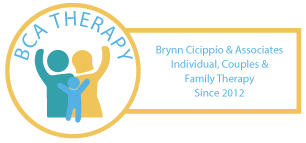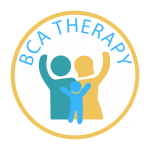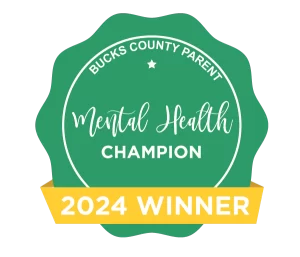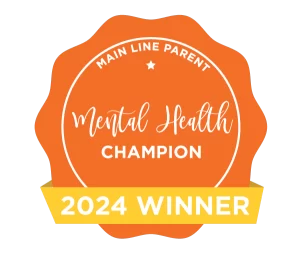Overcome Anxiety with These Specific Skills
How to Work Through It When It’s Not Working for You
 You may not believe it, but anxiety isn’t always bad. It acts as a warning system and sends alerts when there is danger. It helps us identify risks and react to emergencies. Anxiety helps us prepare, navigate uncertainty, anticipate obstacles, and identify possible solutions.
You may not believe it, but anxiety isn’t always bad. It acts as a warning system and sends alerts when there is danger. It helps us identify risks and react to emergencies. Anxiety helps us prepare, navigate uncertainty, anticipate obstacles, and identify possible solutions.
This all sounds great – but then why does it also make us feel so bad?
Anxiety is part of a fight-or-flight response, preparing our bodies to react to danger. If you were being chased by a tiger, your anxious fight-or-flight response would kick in to keep you safe. The problem lies when our brain perceives danger that is not life threatening, such as a job interview, the first day of school, or being in a new environment.
The good news is you can learn to respond to anxiety in a way that is more supportive and productive, while decreasing your anxious thoughts and feelings, and developing strategies to cope.
Here are 3 specific tools to help you work through anxiety when it’s not working for you:
Anxiety challenging skills
When you’re not being chased by a tiger
Engaging in balanced thinking, considering multiple outcomes, and staying connected to your body using progressive muscle relaxation are just some of the tools you can use to work through anxiety when it’s not working for you.
Engage in balanced thinking
Anxiety often propels us into all-or-nothing thinking. This extreme position leaves us feeling hopeless and stuck, unable to create change. We’ve all been there.
“There is no solution to this problem.”
“If I don’t get this right, I’m a failure.”
“They didn’t agree with me. They are against me.”
Next time these thoughts pop up, take back control by reframing them in a more balanced way:
“There are multiple answers to this situation. If I choose to try something new it does not mean it is wrong.”
“I can make mistakes and still succeed.”
“Just because I disagree with someone and we have differences, doesn’t mean they do not like me as a person.”
Consider multiple outcomes
Another way to get unstuck is to think:
“What’s the best case, worst case, and most realistic case scenario?”
With school approaching, lets talk about the possibilities for the first day.
BEST case: Today is going to be the best day ever. I’ll see all my friends, we will have all the same classes, and my teachers will be super cool, creative, and funny.
WORST case: Today is going to be the worst day of my life. No one will talk to me, my teachers will assign tons of homework the first day, and I’ll get lost in this new building.
REALISTIC case: I have teachers who care about my learning, although they may have different teaching styles. I might know someone in my class or I’ll meet new people and make new friends. I might not know where to go, but I can ask for help from a teacher or student and make it to class without getting lost.
Considering all 3 options slows down our thinking, gets all parts of our brain working together, and helps us gain control over anxiety and not stay stuck.
Progressive Muscle Relaxation
Using our bodies is an effective way to reduce anxious feelings and get unstuck.
Progressive Muscle Relaxation (PMR) is a structured exercise where you tense then release certain areas of the body, one at a time, starting from the top of your head and moving down. Being mindful of the release and noticing the changes in your body increases your closeness to calmness and relaxation.
PMR increases your mind-body connection, slows down the strong emotional and reactive parts of the brain, and slows down breathing. All of these outcomes are effective and proven in gaining control over anxiety.
In addition to these three skills, Veronica works with clients to utilize logic to identify unhelpful thoughts and work to disprove them and practice in-the-moment strategies to cope with anxiety that you can use outside of sessions.
Veronica is available now to support you and help you take control over your anxiety when it’s not working for you.
We LOVE our clients!
Immediate help is always available
All new clients receive a return call or email (double check your spam folder) in less than 24 hours.
BCA Therapy does not maintain a waitlist and we never will. There shouldn’t be any roadblocks when you are asking for help.
Mental Health Champion
BCA Therapy has been awarded a LOVE Award as a Mental Health Champion for both our Bucks County and Main Line locations. We are so grateful and couldn’t be more proud of our clients and how they show up for themselves every week!
Learn More
Have Self-Love in your Life
Self-Love comprises four aspects which include self-worth, self-awareness, self-esteem, self-care, and self-esteem. If one is missing, then you do not entirely have self-love. To have it, we should be aligned with these four aspects.
- Self-Worth is the level of importance you place on yourself. It is emotional outlook that determines how and what you feel about yourself in comparison to other people.
- Self-Awareness is being aware of your thoughts, how they affect your emotions, and how emotions cause you to act. Having self-awareness helps you understand yourself and is a big part of your personal development and is a key part to achieving success.
- Self-Esteem is a positive or negative orientation towards oneself. To boost your self-esteem, do things you enjoy, spend time with people who make you happy, and take care of yourself.
- Self-Care is the practice of taking action in protecting your own well-being and happiness, especially during times of stress. There are many ways can practice self-care, but it typically looks different for each individual. Start a healthy self-care routine that works for you!

Mental Health during the Holiday Season
These are supposed to be happy times during the holiday seasons. Between everything that may be going on holiday parties, family get togethers, vacations, and celebrating the new year. The holidays can be full of joy, but they can also be stressful and challenging for those impacted by mental health, devastation, or loss of a loved one.
According to NAMI, “You are not alone”, as a 2021 survey showed that three in five Americans feel the holidays negatively impacted their mental health [1].
So, what are ways that we can care for our self during the holiday seasons?
Here are some tips to prevent holiday stress and depression:
- Take care of yourself. This can be done through self-care and forming healthy habits. For example, going on a walk, doing yoga, going to the gym, watching a movie, reading a book or something that can help you feel less worried and take your mind off a stressful environment and help you boost your mental health and deal with stressful activities.
- Ask for help. Talk with a therapist or make plans with a trusted individual, best friend that you can trust, or a trusted family member. Asking for help is not a weakness, it shows that you are strong and have the courage to do so you matter. If you are sad, anxious, depressed, stresses please don’t be afraid to ask for help. BCA Therapy has therapists in Wayne and Yardley that can help you today!
- Focus on what you can control. Don’t worry about things that are out of your control. If something is bothering, you that is out of your control quit worrying about it and thinking about it, there is nothing you can do about it. This will help you relieve a lot of stress and help you focus on what is in your control.
- Avoid drugs and alcohol. Just because everyone around you is drinking doesn’t mean you have too as well. If someone offers you a drink and you don’t want to drink say “NO”. It is important to set boundaries for the holiday season no matter who is around. By avoiding drugs and alcohol you avoid an increase in depression, anxiety, and other mental health issues.
- Identify holiday triggers. Triggers could be people, places, and things that remind you of past trauma or upsetting events. Examples of holiday triggers could be traumatic memories, a narcissist family member, a loss of a loved one, stressful family relationships, or emotional breakups. To avoid holiday triggers put a plan in place ahead of the holidays to avoid these emotional holiday triggers. These plans can put a plan in place to avoid those triggers and help you reduce holiday related stress.
Source:
[1] Mental Health During the Holidays: 8 Tips That Can Help | NU
Learn More

How to Prepare Your Mental Health As You Transition to College
If you are heading to college with a diagnosed mental health condition, you are not the only one. Many new students are in therapy, take medications, receive support services through college, private tutors, guidance counselors, or other agencies. Planning ahead for your mental health and academic support needs will make your transition to college healthier, easier, and more comfortable. Know the steps to prepare your mental health before stepping onto a college campus can help you so much.
- Time management– College can be more demanding than high school, plan to devote more time to your studies. Plan out your days and create a routine that you stick to every week. Having an assignment book to mark important assignments and tests can make your experience of college so much easier.
- Socializing– It can be fun to meet your roommate(s) and others on the floor in your building. Just remember that some people thrive on social interaction while others may struggle with that, so be kind to one another.
- Independence– Now that you’re on your own, you may feel the need to test your limits. Don’t make bad decisions based on peer pressure. Say “NO” to things you don’t want to do. Setting boundaries is very important and do not let people step over your boundaries and respect other people’s boundaries.
- Resources– Be sure to use to familiarize yourself with the resources on college campus. Consider joining a student organization and being involved. There is also learning assistance and resource centers, and student health services and counseling centers that can assist you if needed.
- Stress– Being aware that some amount of stress and anxiety is normal. You are in a setting with new people and new challenges. You can do this!

Sources:
Family Matters: Making the Transition to College – West Chester University (wcupa.edu)
Planning Ahead for Your Mental Health Care as You Transition to College | The Jed Foundation
Learn More
Narcissists Can Impact Your Life for the Worse!
Recovering for narcisstic abuse is possible, but it requires an incredible amount of strength and courage. Courage that you absolutely possess, if you’re willing to “Do the Work”. At BCA Therapy we have therapists in Yardley and Wayne, Pennsylvania that specialize in narcissistic abuse and are here to support you on this journey of recovery. Yourself respect has to run deeper than your feelings. Loving someone isn’t a reason to stay with someone who is continuously hurting you and disrespecting you. This is what is called a toxic relationship. If you do not take the first step and do the right thing by leaving the narcissist this will affect your mental health.
How can a narcissist impact your life? Let’s look at the jar here is how:
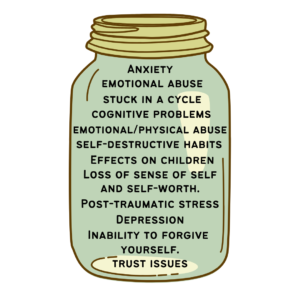 How much more are you going to take from a narcissist? Don’t you think it’s time to get away from them? The answer is you should take no more from them and get away from them. They are ruining your mental health. The jar can only hold so much just like your emotions! Don’t let it get that full before it overflows. This requires courage and strength to stay away from narcissists. But at BCA Therapy, we believe everyone is capable of doing this if you are willing to put the work in and do so. It will be so worth it, and the extra baggage will be lifted off you mentally.
How much more are you going to take from a narcissist? Don’t you think it’s time to get away from them? The answer is you should take no more from them and get away from them. They are ruining your mental health. The jar can only hold so much just like your emotions! Don’t let it get that full before it overflows. This requires courage and strength to stay away from narcissists. But at BCA Therapy, we believe everyone is capable of doing this if you are willing to put the work in and do so. It will be so worth it, and the extra baggage will be lifted off you mentally.
Visit BCA Therapy we are located in the Bucks County and on the Main Line in Wayne, Pennsylvania! We have therapists that specialize in narcissistic abuse can help support you on your journey to recovery.
Learn More